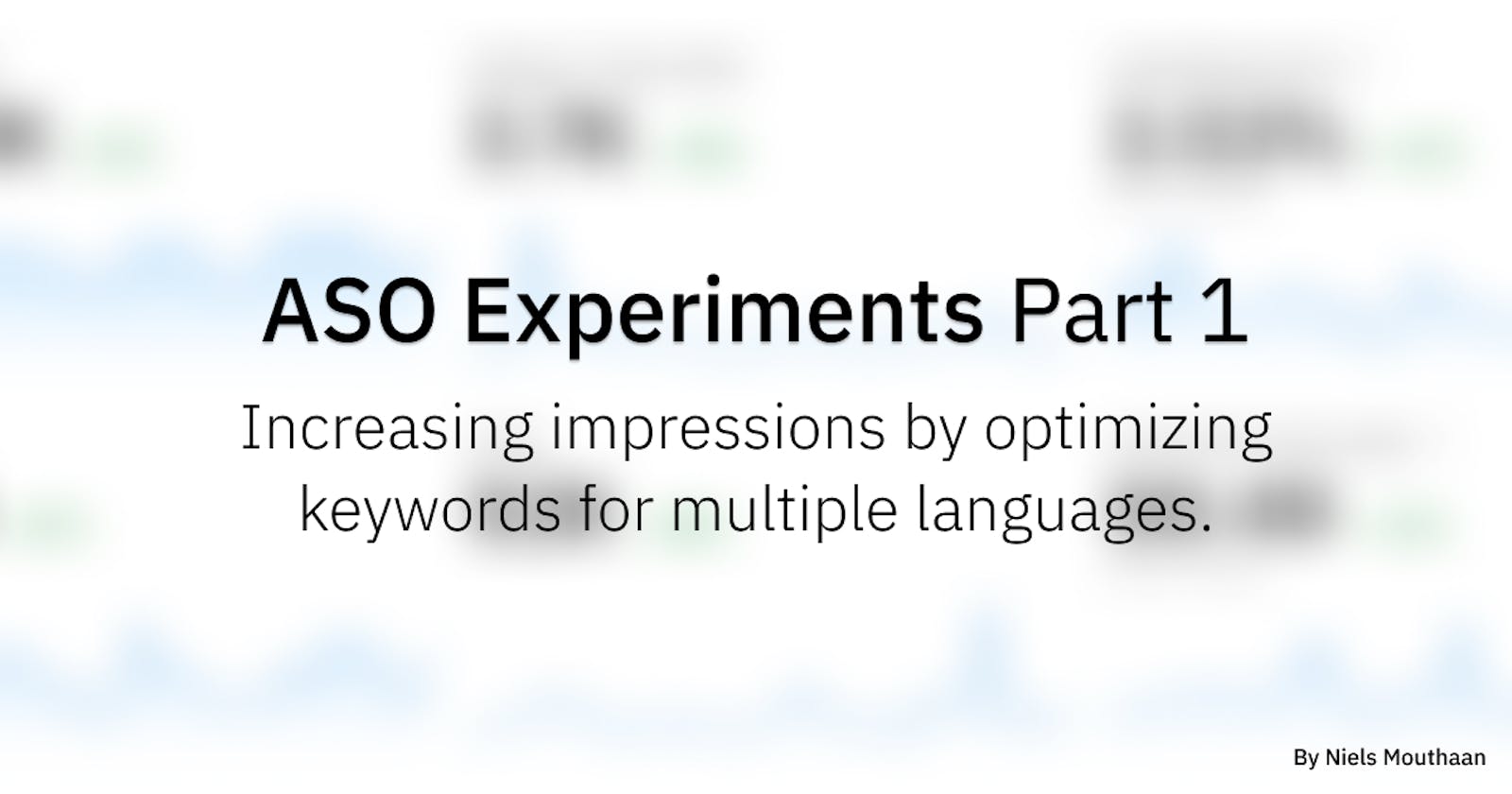ASO Experiments Part 1: Increasing impressions by optimizing keywords for multiple languages
Welcome to a series of articles in which I provide results of various ASO (App Store Optimization) experiments for one of my apps, Daily Time Tracking. By running these experiments, I aim to increase the number of impressions, ultimately leading to an increase in revenue. Keen to do the same for your app? My findings might be helpful! Subscribe to be notified of new articles, and please get in touch if you have questions or feedback 👍.
About the app
Daily Time Tracking is a time tracking app available exclusively on the Mac App Store. The app and App Store listing is available in English, Dutch, German, French, and Spanish. The App Store listing is also available in Chinese (both simplified and traditional). Due to its rating (4.6/5 based on 700+ reviews), it is ranked relatively high when searching for relevant keywords (e.g. time tracking). Although the market is quite saturated, it has found a niche as it works by periodically asking what the user is doing. It removes the need to toggle timers, an approach most traditional time trackers are following. Also, the Mac App Store isn't as crowded as its iOS counterpart, making it easier to rank higher without focussing too much on long-tail keywords.
Earlier conducted ASO
I've already optimized keywords last year that has resulted in a significant increase in impressions. Before that, I never spent much time optimizing keywords, so I wasn't surprised by seeing some good results. I applied common ASO techniques, including:
Making use of the full 100 available characters by eliminating spaces, adding as many (relevant) keywords as possible, and avoiding duplication also taking into account Apple handling plurals automatically. More on this here.
Introducing relevant keywords in the app name and subtitle fields. More on this here.
Doubling available characters for keywords by adding additional languages effective for the same country. More on this here.
Optimizing keywords by evaluating their search volume, competition, and relevance. This needs to be done on an ongoing basis in order to optimize results. Many of the conducted and planned experiments of this blog post series will be related to this so stay tuned for my approach and its results.
As mentioned, the results of the above efforts turned out to be rewarding:
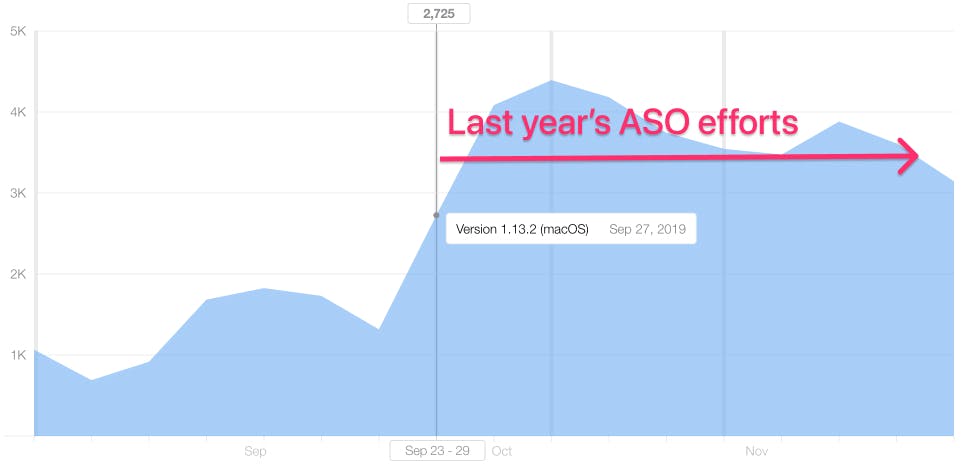
How to find keywords
Before we dive into the experiments, let me first explain how I find and define keywords as I use this technique for most of them. My approach is roughly this:
List many (50+) relevant (long-tail) keywords by categorizing, describing, and evaluating the app, its competitors, and their reviews. More on this here.
Sort them initially based on relevance (e.g. Work hour tracker is more relevant than Weekly report for Daily).
Optimize the sorting further by looking at the search volume (higher is better) and competition (lower is better). The latter is especially important for highly-competitive apps in saturated markets. Daily is a bit of a different story as it is available exclusively on the Mac App Store, which is less saturated, and already has a good rating (as this affects your app's visibility). Hence, my focus is primarily on finding relevant keywords with a high search volume and not so much on finding low-competition keywords. Various ASO tools such as Appfigures can be used to look up search volume and competition. I also use Google Ads' Keyword Planner, assuming the web doesn't differ too much from app stores in terms of searching for solutions (apps) to problems.
Comma-separate each word in the list. Hence, time tracking becomes time,tracking. Clean the list by:
Removing duplicates.
Removing spaces.
Removing plurals (e.g. hours as hour will also rank for hours).
Removing unrelated words such as of, the, best, etc.
At this point, you should have a nice list of comma-separated and relevant keywords. Pick the most representable keywords and try putting them in your app name and subtitle. Remove those from your list as you will rank for keywords in your app name and subtitle.
Try to fit as many keywords as possible in the keyword field, which may hold up to 100 characters.
Translating keywords
As mentioned earlier, Daily is available in several languages. I used (human) translation services for translating the app and its App Store listing including description, app preview, and screenshots. While this worked well, I prefer translating keywords myself, even for languages I don't speak myself. This is mainly because of the faster turnaround (seconds instead of days) and the relative simplicity of keywords. This is how I do it:
Translate keywords to a target language (e.g. German) using Google Translate and search for them on Google to find out what makes sense and what doesn't.
Use Google Ads' Keyword Planner to search for translated keywords and look at their volume and competition. Again check what makes sense and what doesn't. Make sure you change the language (e.g. German) and region (e.g. Germany) to get the right data. And perhaps more useful: suggestions for alternative keywords are shown, which is exactly what you need. This allows you to optimize your list of translated keywords.
Use App Annie's Keyword Search to find existing apps using translated keywords. Make sure you're searching the right region (e.g. Germany). Are you getting apps similar to yours? If so, what keywords can you extract from those apps?
This edition's experiments
For the first set of experiments, I decided to keep things simple and stick with another round of keyword improvements. I started those experiments on Thursday, November 12th, and let them run for 2 weeks.
Optimize English app name, subtitle & keywords
Like most apps, English (U.S.) and English (U.K.) are Daily's most important languages. Not only because the United States is Daily's biggest market, English (U.K.) is also used as the primary language for most countries. Hence, it's critical they perform as well as possible.
Changes
| Field | Old value | New value |
| App name | Daily Time Tracking | Daily - Easy Time Tracking |
| Subtitle | Project & Activity Tracker | Accurate work & hour tracker |
| Keywords | timesheet, work, task, log, workday, report, timer, hour, registration, calculator, job, activities, automatic | report, log, activity, track, management, timesheet, timekeeping, sheet, keeping, project, hours, keeper, timer |
Note that the keywords contain spaces but that's to visualize it better for you. Also, note that it still includes hours. That's my bad 😅.
Results
In order to evaluate the effect of the above changes, I compared both the United States and the United Kingdom with their previous periods. I also applied the App Store Search filter to ensure I only get impressions as a result of a user searching. This is crucial to avoid bias as a result of marketing campaigns and other promotional activities.
The United States
Previous period: 2.079 (daily average 149)
Current period: 2.345 (daily average 168), up by 12.8%.
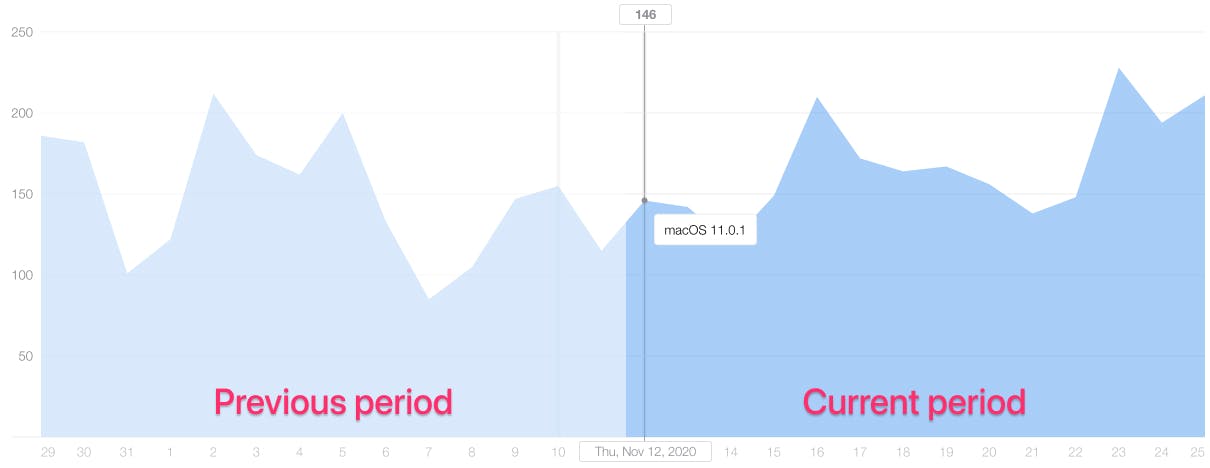
The United Kingdom
Previous period: 393 (daily average 28)
Current period: 406 (daily average 29), up by 3.3%.
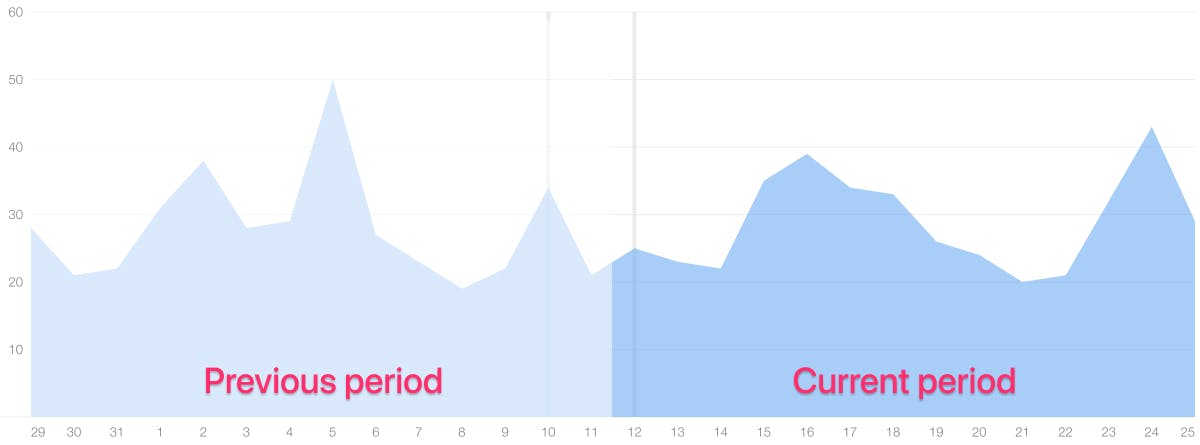
Especially the United States has seen a significant increase in impressions. However, the United Kingdom has a much lower increase rate. This makes it difficult to conclude whether the new values actually make a difference. Other factors such as competitors or the industry in general could be responsible.
Optimize Dutch app name, subtitle & keywords
As a native Dutch speaker, optimizing keywords for my own language is relatively easy compared to languages I don't speak myself (which is the case for the upcoming experiments). The goal is to increase impressions for the Netherlands.
Changes
| Field | Old value | New value |
| App name | Daily Time Tracking | Daily - Tijd & urenregistratie |
| Subtitle | Project & Activity Tracker | Gemakkelijk uren registreren |
| Keywords | tijd, werk, uren, urenregistratie, tijdregistratie, registratie, urenstaat, registreren, taken, overzicht | uur, urenstaten, urenstaat, tijdsregistratie, tijdregistratie, uurregistratie, werkrapport, registratie |
Note that the app name is (partially) translated and now contains Dutch keywords.
Results
To evaluate this experiment, I compared the current period with the previous period with filter Netherlands and App Store Search.
Previous period: 231 (daily average 17)
Current period: 228 (daily average 16), down by 1.3%.
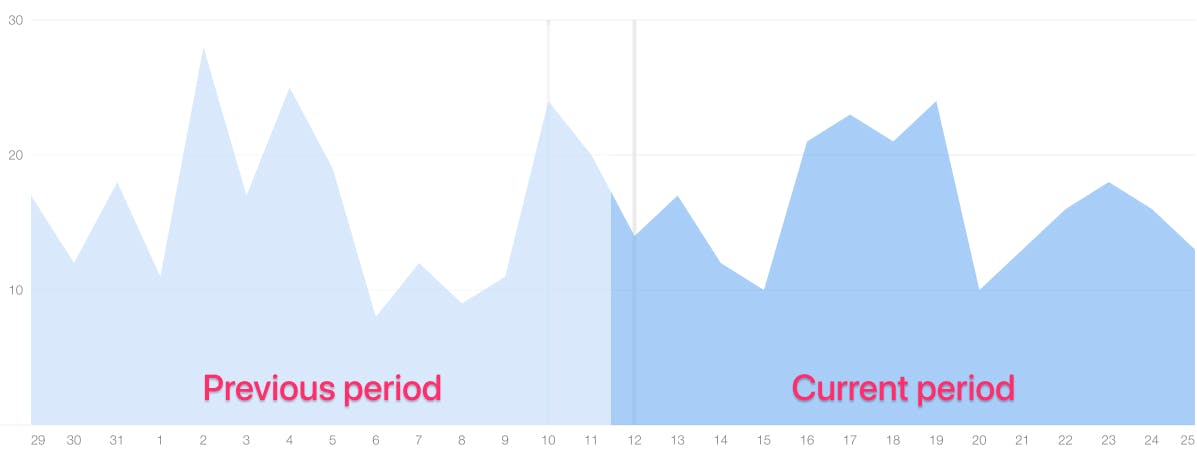
Although the number of impressions went down slightly, the difference is so little that we can conclude that the new values don't make any difference.
Optimize German app name, subtitle & keywords
Some think Dutch (my native language) and German are almost the same 😅. They aren't, although there are similarities. As a result, finding good keywords for me is tricky, as I don't speak German. Hence, I had to translate them by applying the translation techniques described earlier.
Changes
| Field | Old value | New value |
| App name | Daily Time Tracking | Daily - Einfache Zeiterfassung |
| Subtitle | Projekt & Aktivitätstracker | Erfassung von Arbeitszeiten |
| Keywords | zeit, zeiterfassung, log, rechner, arbeit, arbeitstabelle, aufgabe, stechuhr, automatik, registrierung, stunde | arbeitszeiterfassung, stempeluhr, stundenerfassung, stundenzettel, arbeitsstunden, arbeitszeittabellen |
Results
To evaluate this experiment, I compared the current period with the previous period with filter Germany and App Store Search.
Previous period: 588 (daily average 42)
Current period: 714 (daily average 51), up by 21.4%.
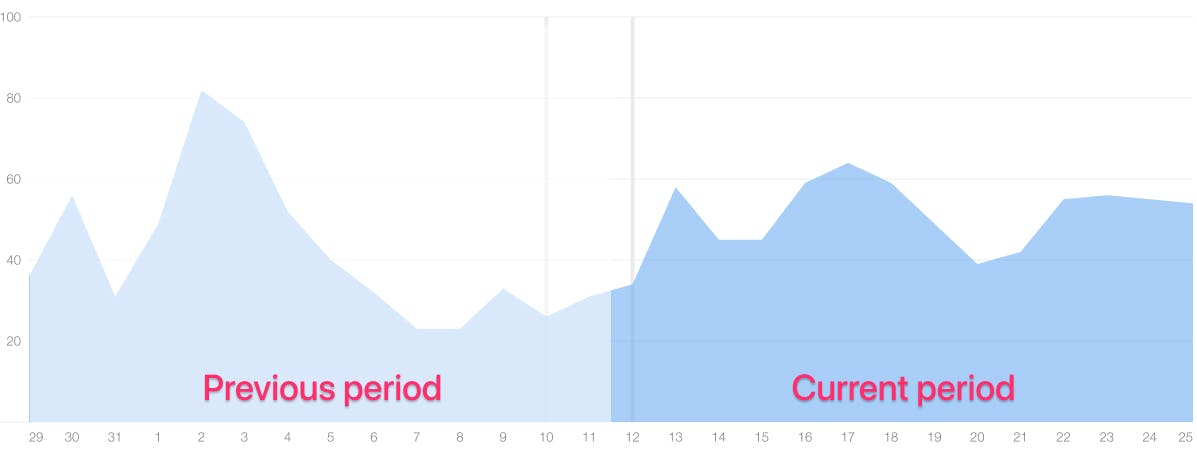
This looks promising! I got a significant increase in impressions in Germany. An important note though: Changing English (UK) might also have affected Germany as a region. This is because English (UK) is considered too when users search in most non-English App Stores. For example, when a user is searching within the German App Store, both German and English (UK) listings of apps are evaluated. When running your own experiments it might make sense to keep English (UK) as-is in order to reduce bias when analyzing results. In my case looking at experiments for other languages help drawing a conclusion about this German experiment. Already looking at the earlier described Dutch experiment and its result (down by 1.3%), it is likely that the increase in impressions in Germany is a result of optimizing the German app name, subtitle, and keywords. Awesome 👍.
Optimize French app name, subtitle & keywords
I don't know any French besides the usual words (oui, non and this sentence 😂). So I again applied earlier mentioned translation techniques to find French keywords.
Changes
| Field | Old value | New value |
| App name | Daily Time Tracking | Daily - Gestion du temps |
| Subtitle | Tracker de Projet et Activité | Suivre les heures de travail |
| Keywords | temps, traqueur, feuille, travail, tâche, rapport, minuteur, heure, emploi, enregistrement, log, fois, horaire | suivi, emploi, feuilles, feuille, temps, temp, emplois, edt, feuille, rapport, enregistrement, gérer, toggl |
Results
To evaluate this experiment, I compared the current period with the previous period with filter France and App Store Search.
Previous period: 584 (daily average 42)
Current period: 706 (daily average 50), up by 20.9%.
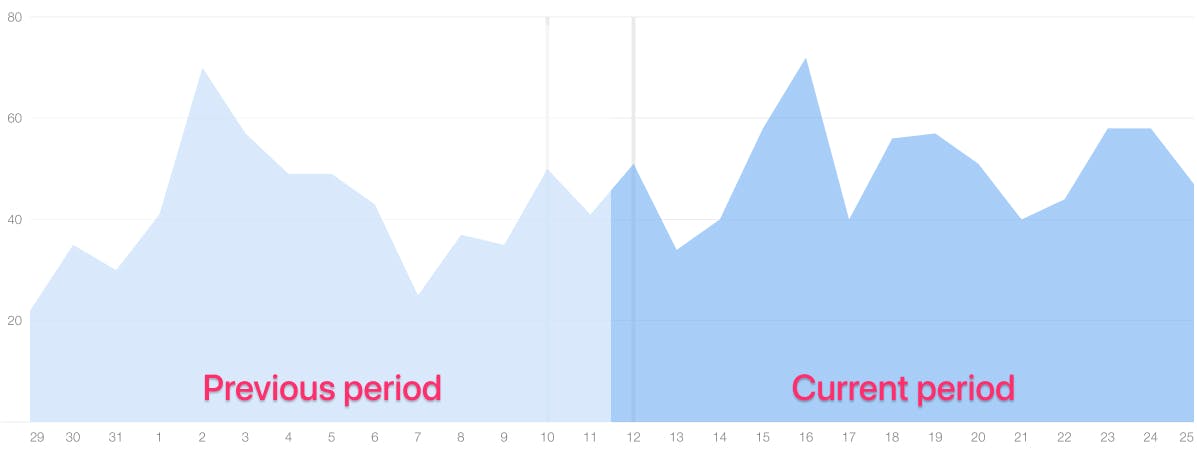
Another significant increase!
Optimize Spanish app name, subtitle & keywords
Not only is Spanish one of the most popular languages, but also a lot of people living in Spanish-speaking countries do not speak English. Enough reason for me to offer Daily in Spanish.
Note that you have Spanish (Spain) and Spanish (Mexico). The latter is used as the primary language for Spanish-speaking countries in Latin America. Although there are definitely differences, I'm using the same translations for both languages.
Changes
| Field | Old value | New value |
| App name | Daily Time Tracking | Daily - Seguimiento de tiempos |
| Subtitle | Proyecto & Actividad | Registro de horas de trabajo |
| Keywords | tiempo, rastreador, automático, horario, trabajo, tarea, registro, reporte, seguimiento, día, hoja, hora, reloj | hora, horarios, horario, parte, hoja, tiempo, registrar, registro, reporte, productividad, rastreador, toggl |
Results
To evaluate the results of this experiment, I compared the current period with the previous period with filter Spain and App Store Search.
Previous period: 248 (daily average 18)
Current period: 287 (daily average 21), up by 15.7%.
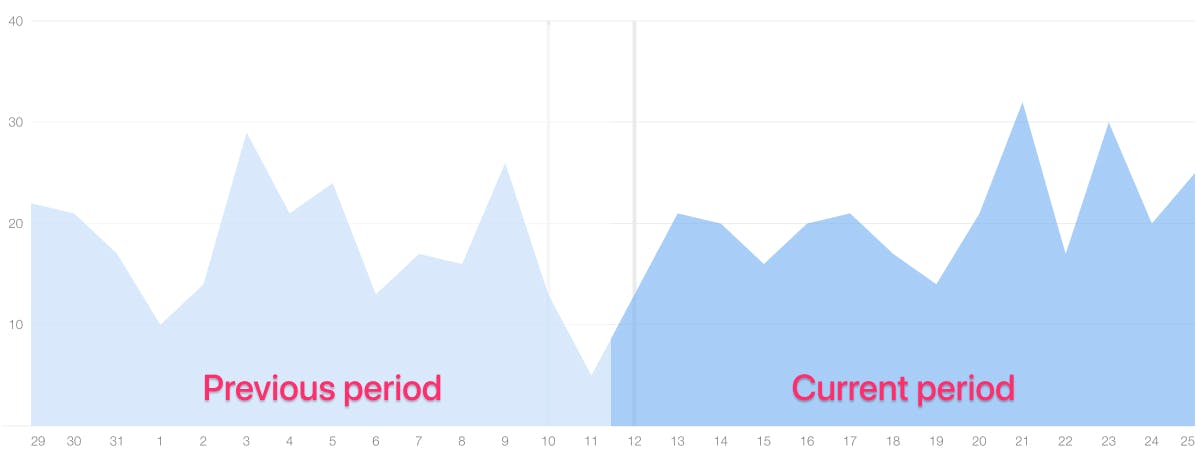
That's another nice increase in impressions. Let's compare this to Mexico, which is using Spanish (Mexico) instead:
Previous period: 111 (daily average 8)
Current period: 104 (daily average 7), down by 6.3%.
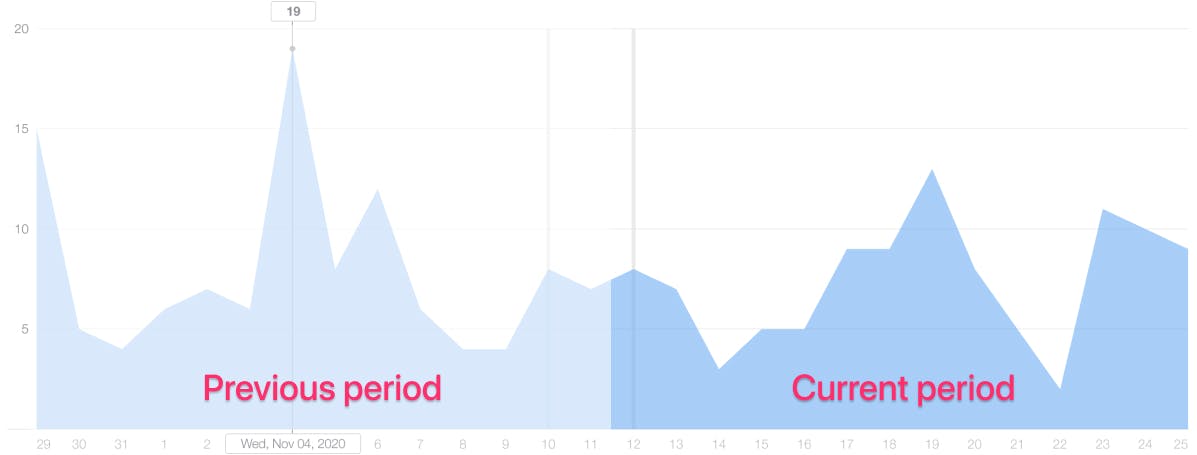
That's a bit of a disappointment. However, there's a spike in the previous period (on November 4th) that's mainly responsible for the larger amount of impressions. I have to keep looking at its performance in order to determine whether the effect of the changes as numbers from Spain and Mexico are contradicting. There could be another factor in play.
This editions' key takeaways
Some key takeaways as a result of running the above experiments and analyzing them:
ASO takes time but can lead to incredible results! As you have seen, my first series of optimization last year has resulted in a 200%+ increase in impressions. Some of this edition's experiments alone resulted in an increase of more than 20%.
ASO is an ongoing process. What works now might work less in the future. The search behavior of users is constantly changing. I made it a habit to define and run multiple experiments each time I update my apps.
There are great tools helping you with ASO. My personal favorites are Google Ads's Keyword Planner, Appfigures and App Annie. You can even use these tools to find keywords for languages you don't speak yourself.
It's hard (sorry, impossible) to remove bias fully. This makes it difficult to draw conclusions. Taking my Spanish experiment as an example, why do its changes work so well for Spain but not that well for Mexico? But you can do a few things to avoid having too much bias. E.g. applying the App Store Search filter to ensure you're evaluating impressions as a result of a user searching (and your app ranking for it). Also avoid running experiments that might influence each other by taking into account that most countries utilize multiple languages. Something I didn't do😅.
Next editions' experiments
The next editions' experiments are already running and include:
Introducing English (Australia) with secondary English keywords to increase impressions in Australia and New Zealand.
Introducing English (Canada) and French (Canada) to increase impressions in Canada.
Adding most relevant keywords (e.g. “time tracking”), already visible in app name and subtitle, in the keywords field to further increase ranking on those words. Most experts contradict the effectiveness of this. Let's see 👍.
Changing category from Productivity to Business to increase impressions as a result of App Store browsing (hence, not searching).
Introducing a more notable app preview to increase product page views.
Subscribe to get notified when their results are available 👍. Hope you enjoyed this edition!

